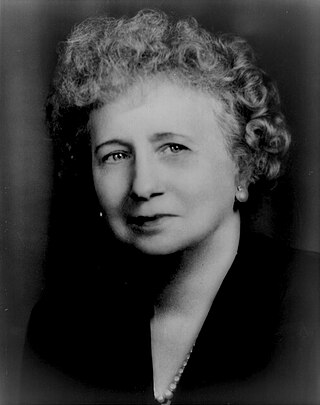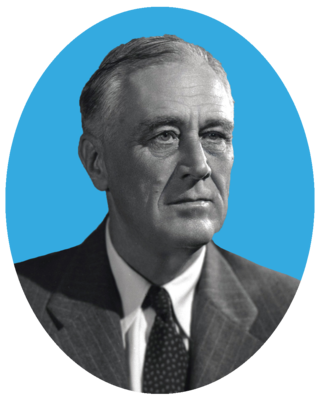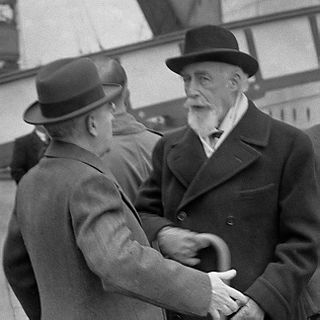
James Francis Byrnes was an American judge and politician from South Carolina. A member of the Democratic Party, he served in U.S. Congress and on the U.S. Supreme Court, as well as in the executive branch, most prominently as the 49th U.S. Secretary of State under President Harry S. Truman. Byrnes was also the 104th governor of South Carolina, making him one of the very few politicians to have served in the highest levels of all three branches of the American federal government while also being active in state government.

John Lewis Gaddis is an American military historian, political scientist, and writer. He is the Robert A. Lovett Professor of Military and Naval History at Yale University. He is best known for his work on the Cold War and grand strategy, and he has been hailed as the "Dean of Cold War Historians" by The New York Times. Gaddis is also the official biographer of the prominent 20th-century American diplomat and historian George F. Kennan. George F. Kennan: An American Life (2011), his biography of Kennan, won the 2012 Pulitzer Prize for Biography or Autobiography.

Elizabeth Virginia Truman was the wife of President Harry S. Truman and the First Lady of the United States from 1945 to 1953. She also served as the second lady of the United States from January to April 1945. At 97 years, 247 days, she remains the longest-lived first and second lady.
Merle Dale Miller was an American writer, novelist, and author who is perhaps best remembered for his best-selling biography of Harry S. Truman, and as a pioneer in the gay rights movement.

Harry S. Truman was the 33rd president of the United States, serving from 1945 to 1953. A member of the Democratic Party, he previously served as a United States senator from Missouri from 1935 to 1945 and briefly as the 34th vice president in 1945 under Franklin D. Roosevelt. Assuming the presidency after Roosevelt's death, Truman implemented the Marshall Plan in the wake of World War II to rebuild the economy of Western Europe and established both the Truman Doctrine and NATO to contain the expansion of Soviet communism. He proposed numerous liberal domestic reforms, but few were enacted by the conservative coalition that dominated the Congress.

The 1944 Democratic National Convention was held at the Chicago Stadium in Chicago, Illinois from July 19 to July 21, 1944. The convention resulted in the nomination of President Franklin D. Roosevelt for an unprecedented fourth term. Senator Harry S. Truman of Missouri was nominated for vice president. Including Roosevelt's nomination for the vice-presidency in 1920, it was the fifth time Roosevelt had been nominated on a national ticket. The keynote address was given by Governor Robert S. Kerr of Oklahoma, in which he "gave tribute to Roosevelt's war leadership and New Deal policies."
Robert Hugh Ferrell was an American historian. He authored more than 60 books on topics including the U.S. presidency, World War I, and U.S. foreign policy and diplomacy. One of the country's leading historians, Ferrell was widely considered the preeminent authority on the administration of Harry S. Truman, and also wrote books about half a dozen other 20th-century presidents. He was thought by many in the field to be the "dean of American diplomatic historians", a title he disavowed.

This bibliography of Harry S. Truman is a selective list of scholarly works about Harry S. Truman, the thirty-third president of the United States (1945–1953). See also the bibliographies at Harry S. Truman, Presidency of Harry S. Truman, and Foreign policy of the Harry S. Truman administration.

Harry S. Truman's tenure as the 33rd president of the United States began on April 12, 1945, upon the death of president Franklin D. Roosevelt, and ended on January 20, 1953. He had been vice president for only 82 days when he succeeded to the presidency. Truman, a Democrat from Missouri, ran for and won a full four-year term in the 1948 presidential election, in which he narrowly defeated Republican nominee Thomas E. Dewey and Dixiecrat nominee Strom Thurmond. Although exempted from the newly ratified Twenty-second Amendment, Truman did not run for a second full term in the 1952 presidential election because of his low popularity. He was succeeded by Republican Dwight D. Eisenhower.

The Truman Balcony is the second-floor balcony of the Executive Residence of the White House, which overlooks the South Lawn. It was completed in March 1948, during the presidency of Harry S. Truman.

The Democratic Party's 1944 nomination for Vice President of the United States was determined at the 1944 Democratic National Convention, on July 21, 1944. U.S. Senator Harry S. Truman from Missouri was nominated to be President Franklin D. Roosevelt's running-mate in his bid to be re-elected for a fourth term.

Herman Benjamin Baruch was an American physician and diplomat who served as United States Ambassador to the Netherlands and Portugal.
William Beatty Pickett is an American historian and professor emeritus at Rose-Hulman Institute of Technology in Terre Haute, Indiana. He is known as an authority on President Dwight D. Eisenhower and Indiana Sen. Homer E. Capehart, and is the author of several well-regarded books on U.S. history including Dwight David Eisenhower and American Power and Eisenhower Decides To Run: Presidential Politics and Cold War Strategy.

Peace in Their Time: The Origins of the Kellogg-Briand Pact is a 1952 book by historian Robert H. Ferrell tracing the diplomatic, political and cultural events in the aftermath of World War I which led to the Kellogg–Briand Pact of 1928, an international agreement to end war as a means of settling disputes among nations. Ferrell's first book, Peace in Their Time elaborates on and extends Ferrell's 1951 Ph.D. dissertation, The United States and the Origins of the Kellogg-Briand Pact, which won Yale's John Addison Porter Prize for original scholarship. Peace In Their Time itself went on to win the American Historical Association's 1952 George Louis Beer Prize for outstanding historical writing. Ferrell would go on to become a professor at Indiana University and one of the most prominent historians in America, and wrote or edited more than 60 other books on historical topics. Historian Lawrence Kaplan praised Peace in Their Time as a harbinger of the high quality of Ferrell's subsequent career, stating that it "contained the special qualities that animated all his future work."

Harry S. Truman: A Life is a 1994 biography of Harry S. Truman, president of the United States from 1945 to 1953, by historian Robert Hugh Ferrell. Although it was overshadowed by the popular success of David McCullough's Pulitzer-winning biography Truman, Ferrell's book was widely praised by scholars in his field.

Dear Bess: The Letters from Harry to Bess Truman, 1910-1959 is a 1983 book edited by historian Robert Hugh Ferrell collecting more than 500 letters from U.S. president Harry S. Truman to his wife Bess, ranging from the couple's early courtship to his post-presidency retirement. Well-regarded by other historians, the book also achieved popular success, becoming a New York Times bestseller.

The Dying President: Franklin D. Roosevelt, 1944–1945 is a 1998 book by historian Robert Hugh Ferrell about the cardiovascular illness which Roosevelt suffered during the last year of his life and presidency. Ferrell examines the lengths to which the president and his medical advisers went to keep the public in the dark about the illness, as well as the political and diplomatic problems that arose both from the illness and the secrecy. He argues that Roosevelt was too sick to have remained in office, and that his inability to work led to critical foreign-policy mistakes in the closing year of World War II and a failure to properly prepare Harry S. Truman to take over as president after Roosevelt's death.

Choosing Truman: The Democratic Convention of 1944 is a 1994 book by historian Robert Hugh Ferrell about the political convention in Chicago which nominated Franklin D. Roosevelt for his fourth election to the U.S. presidency, but jettisoned Vice President Henry A. Wallace in favor of Missouri Sen. Harry S. Truman. The choice was particularly significant because Roosevelt would die in office the following year, making Truman the 33rd president.

Ill-Advised: Presidential Health and Public Trust is a 1992 book by historian Robert Hugh Ferrell examining politically motivated cover-ups of serious medical issues afflicting U.S. presidents while they were in office. Although Dwight Eisenhower is the main focus of the book, it covers the presidency for a century, from Grover Cleveland's mouth cancer in 1893 to the health of George H. W. Bush, then-current president when the book was first published. All of these instances, Ferrell argues, raised serious questions about the fitness of each president to hold office, as well as whether the presidents and their physicians violated the public trust in keeping the incidents secret.
The following is a list of works about the spouses of presidents of the United States. While this list is mainly about presidential spouses, administrations with a bachelor or widowed president have a section on the individual that filled the role of First Lady. The list includes books and journal articles written in English after c. 1900 as well as primary sources written by the individual themselves.















